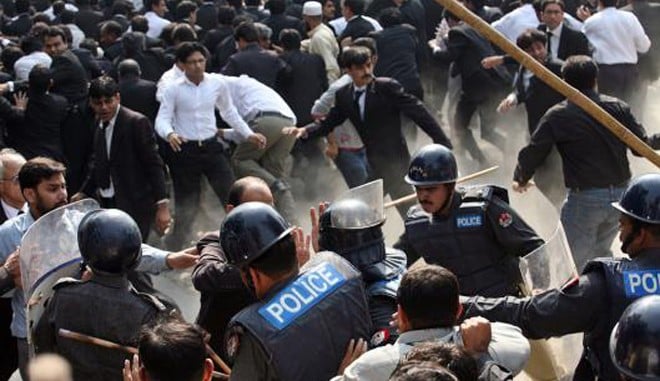
Civil society is the breathing space that a society with conscience and heart confers upon itself

Pakistani civil society is diverse, divided, layered, warm, loud, intimate, paradoxical, unhappy, and anxious.
On a lighter note, like most Pakistani individuals and institutions of any worth, civil society, too, revels in a shared national syndrome of Inflated Self Importance (ISI). Then quite like Islam, theory (religion of peace) and practice (do I need to say it?) also have a gap and the belief is not in consonance with the reality on ground.
Being a keen reader of writings on and developments in Pakistan’s ‘civil society’ in the last 20 years, the most amusing line I ever read (in The News Op-ed during the early years of Musharraf) was, "Army is also a part of the civil society!"
All the civil voluntary initiatives (CVIs) that occur in spheres not occupied by state institutions, market practices and family control, form the civil society as we know it. Difference between CVI and CSO (organisation) is of sequence and formalisation. They come in many forms, are named and classified variously based on legal types, functional approach, funding, mandate and governance. The emergence of civil society in a given social setup, thus, starts with informal prompt response to a cause, or concern.
The trigger mostly is compassion, incentive, fear, or interest. The aim is real or perceived collective benefit whose fruits reach the non-members and non-participants also. The blend called civil society, thus, embraces in its fold interests, behaviours, institutions, organisations, social activism and participation.
In political literature, civil society has been analysed through its perceived relationship with, and role vis-à-vis democratic associations (Lock, de Tocqueville), the rule of law (Montesquieu, von Stein), state-society relations (Hegel), the public sphere (Habermas), popular participation (Verba), social capital (Putnam, Coleman), and community (Etzioni).
If we divide, the total space of a society according to modes of individual, collective, volitional, regulated, organised and spontaneous activities, we get four spheres: political, (state and government); economic (where producers of goods and services trade with consumers); ‘familial’ (household and family); and, fourth sphere comprises the rest that can be termed as open-purpose voluntary action sphere.
This is where the civil voluntary initiatives occur, prosper or suffer, and mature to become civil society. However, this sphere interacts, overlaps, influences and is influenced by the other three spheres. A large part of civil society in Pakistan has emerged as proxy and extension of these spheres as government, business and family trusts have supported and nurtured organised activity that is also considered ‘civil society’.
Normatively, one views civil society as amicable blend of difference that may be formal and organised, or informal but palpable. In this blend, the core attributes are diversity and inclusion. Key catalyst that enable civil society to influencing the state, market and family to reform for better are perpetual and sustained conversations and civil dialogues among diverse and divergent opinions and positions so that the extremes in society can live with affable mutuality, respect the difference, show tolerance for the ‘other’ and, thus, let pluralism thrive. Our civil society is cognizant of all this, but is not there yet.
Islamabad used to be one of the greenest capital cities in Asia till the mid 1990s but it is no more. Islamabad has the most educated people and also a ‘vibrant’ civil society but we could not save the environment. Perhaps many of us in civil society were keener in a shorter drive than a greener capital.
After all these years, polemically, civil society may mean different things to different academics, but in popular public imagination when we say civil society, it is very clear who are we praising or punching. This is an achievement in its own right.
On future of civil society in Pakistan, there are two possibilities and two problems. First, we need civil society alongside democracy because in democracy the government of the day tends to uphold the choice of the majority; to balance that, civil society can uphold the flag of the voice of the minority.
The elite in this country are a powerful minority. Over 70 per cent citizens of Pakistan are voiceless, choiceless majority. The civil society, like the elites of this country, also has in its fold the powerful minority, who have power of knowledge, ideas, and ability to negotiate reform and openness away from the street protests. That is the first possibility. The second possibility is that the diverse civil society in diverse and creative ways can influence the political agenda and help reform the government practice to make it more inclusive, democratic, and equitable.
Two problems of our civil society are that, one, it often succumbs to self-righteousness, which hinges on its self-ascribed moral and ethical superiority, and looks down upon popular politics and democratic choices. Two, more often than not, instead of bridging and healing -- which it ably can -- civil society ends up reinforcing the political, social, cultural and faith-based divides and prejudices.
The middle class dreams, desires and social drives have some interesting common threads, be they in civil service, judiciary, army, politics or academia: they all tend to become the elite either through asset accumulation, rent-seeking, acceptance of office promising power, privilege and prestige, or just an urge to be popular. When stated altruistic causes get mixed with asset-making and comfort-seeking privileges in the same stride, the cause is corrupted. Volunteerism is at the heart of whatever civil society aspires, pursues and accomplishes. When it gets distorted, our high moral ground is compromised.
In conclusion, one would assert that civil society is the breathing space a society with conscience and heart confers upon itself. The civil society then must take upon itself to keep the air, which populates the said breathing space, fresh and full of oxygen. A visible pursuit of fresh air for all without prejudice or discrimination, and with no urge to control or any intent to expel some from this space, is the oxygen.